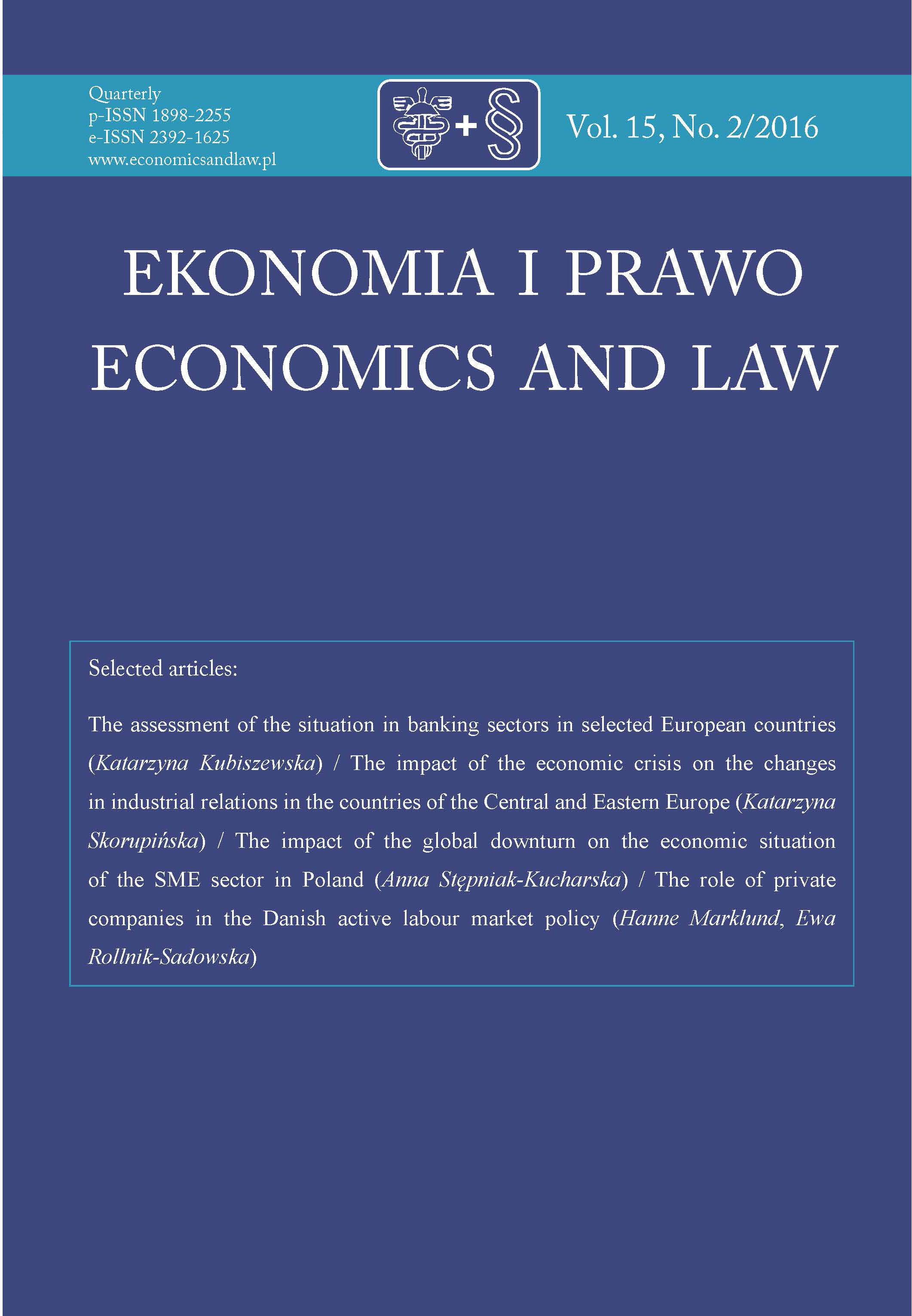THE IMPACT OF THE GLOBAL DOWNTURN ON THE ECONOMIC SITUATION OF THE SME SECTOR IN POLAND
DOI:
https://doi.org/10.12775/EiP.2016.015Keywords
SME, enterprise, profitability, business fluctuations, economic conditionAbstract
Small and medium-sized enterprises play a leading role in modern economies — they create more than 50% of GDP, employ over 70% of people and are a major source of entrepreneurship (more than 99% of entities belongs to the SME sector). The changes in the socio-economic system, initiated in Poland at the turn of 1989 and 1990, became the foundation for the development of entrepreneurship. Nowadays, companies from the SME sector have dominated the market over time and play a key role in the Polish economy. Small and medium-sized companies dominate in the domestic economy as they account for almost 99.9% of all enterprises. Their role in creating GDP is increasing — over the last 25 years, the share of SMEs’ production in GDP almost doubled. The impact of the SME sector on the national economy can be also described through its participation in the creation of jobs. The SME sector is a major employer, employing more than 7.8 mln workers. Therefore, it is important to examine the condition of small and medium-sized enterprises. The purpose of this paper is to analyze the impact of the economic downturn on the financial condition of Polish non-financial SME companies. The survey covered such issues as: the number of active enterprises, number of persons employed and employees, revenues and production, profitability indicators, salaries and labour productivity. The analyses were performed over the period 2003–2013. Data were obtained from Central Statistical Office of Poland.References
Abor J., Quartey P., Issues in SME Development in Ghana and South Africa, “Interna-tional Research Journal of Finance and Economics”, Vol. 39, No 218/2010.
Adamiec J., Russel P., Światowy kryzys gospodarczy a sektor przedsiębiorstw i gospo-darstw domowych w Polsce Kryzys finansowy. Wybrane zagadnienia, Wydawnic-two Sejmowe, Warszawa 2009.
Ayyagari M., Demirgüç-Kunt A., Maksimovic V., Small vs. Young Firms Across The World — Contribution to Employment, Job Creation, and Growth, “Policy Re-search Working Paper”, No 5631/2011, http://dx.doi.org/10.1596/1813-9450-5631.
Bussat V., Restructuring in SMEs: networks and social dialogue. Transverse analysis, [in:] V. Bussat, C.E. Triomphe, B. Köper (eds.), Crisis, Social dialogue and Renew-als in Restructuring. Restructuring in SMEs, http://responsible-restructuring.eu/wp-content/uploads/2013/12/RespRest-WC2-Anglais.pdf (29.09.2015).
European Commission, Economic Crisis in Europe: Causes, Consequences and Re-sponses, “European Economy”, Vol. 7/2009.
Główny Urząd Statystyczny, Działalność przedsiębiorstw niefinansowych, Warszawa, 2004–2014.
Ministerstwo Gospodarki, Koniunktura gospodarcza w wybranych krajach w okresie kryzysu finansowego, Warszawa 2011.
Polska Agencja Rozwoju Przedsiębiorczości, Raport o stanie sektora małych i średnich przedsiębiorstw w Polsce w latach 2010–2011, Warszawa 2012.
Soos K.A., Polish and Hungarian SMEs facing the crisis, [in:] B. Dallago, C. Gulielmet-ti (eds.), The consequences of the international crisis for European SMEs. Vulner-ability ad resilience, Routlege, Oxford 2012.
Stępniak-Kucharska A., Zatrudnienie i wydajność pracy polskiego sektora MSP w okresie dekoniunktury gospodarczej, [in:] A. Organiściak-Krzykowska, K. Nyklewicz (eds.), Rynek pracy w dobie innowacji, Uniwersytet Warmińsko-Mazurski-IPiSS, Olsztyn-Warszawa 2014.
The Economist, SMEs in Japan: A New Growth Driver?, London–New York 2010.
Wojtyna A., Gospodarki wschodzące w obliczu kryzysu finansowego: duża odporność czy podatność?, “Gospodarka Narodowa”, No. 9/2010.
Downloads
Published
How to Cite
Issue
Section
Stats
Number of views and downloads: 520
Number of citations: 0
